
In 2024, How to Unlock Disabled Apple iPhone 13/iPad Without Computer | Dr.fone

How to Unlock Disabled Apple iPhone 13/iPad Without Computer
Forgetting the Apple iPhone 13 or iPad passcode could be the worst nightmare for plenty of iOS users. If you are also locked out of your Apple iPhone 13, then don’t worry. There are several ways to learn how to unlock a disabled Apple iPhone 13 without a computer. Surprisingly, you don’t need to take the assistance of a computer to unlock your iOS device. This guide will make you familiar with how to unlock the iPad passcode without a computer. Read on and learn how to unlock the disabled Apple iPhone 13 without a computer right away.
Part 1: How to unlock disabled Apple iPhone 13 without computer using Siri?
Accessing Siri is the first thing that comes to iOS users’ minds whenever they get locked out of their Apple iPhone 13 . It might surprise you, but you can also take the assistance of Siri to unlock your phone. Most users prefer this technique, as it doesn’t require a computer and can unlock an iOS device without erasing its data.
Though, before you proceed, you need to know the limitations of this method. Since it is considered a loophole in iOS, it doesn’t always yield desirable results. It has been observed that the method only works on devices running from iOS 8.0 to iOS 10.1. To learn how to unlock iPad passcode without a computer, follow these stepwise instructions:
Step 1. Activate Siri on your iOS device by holding the Home button. Ask for the present time by giving a command like “Hey Siri, what time is it?” to proceed. Siri will let you know the current time by displaying a clock. Tap on it.

Step 2. Tap on the Add (plus) icon.

Step 3. From here, you can search for a city. Just type anything you want and tap again to get various options. Choose the “Select all” button to get more options.

Step 4. Select the feature of “Share.”

Step 5. Tap on the message icon.

Step 6. It will open another interface to draft a new message. Wait for a while and write something in the “To” field. Once you are done, tap on the return button on the keyboard.

Step 7. This will highlight your text in green. Now, tap on the add icon located nearby.

Step 8. A new interface would be launched to add a new contact. From here, tap on the “Create New Contact” button.

Step 9. Instead of adding information regarding a new contact, tap on the photo icon, and choose the option of “Add Photo.”

Step 10. This will open your device’s gallery. You can browse your photo library from here.

Step 11. After a while, press the Home button. If everything goes right, you will enter the Home screen of your iOS device after unlocking it.

By following this technique, you would also learn how to unlock the disabled Apple iPhone 13 4. Though, you need to ensure that the iOS device you are using would support this feature.
Part 2: How to unlock disabled Apple iPhone 13 using Find My Apple iPhone 13?
The chances are that your iOS device might not work with the above-stated solution, or it’s latest iOS version. Therefore, you would be required to take the assistance of another method to unlock your device. With the help of Apple’s official Find My Apple iPhone 13 service, you can easily restore your device remotely. It is also used to locate an iOS device, play a sound, and lock it remotely.
After implementing this solution, your iOS device will reset, and your data would be erased. Nevertheless, in the end, it will automatically reset its lock as well. Follow these steps:
Step 1. Open iCloud’s website on any other handheld device of your choice. Not just your system, you can open the website on any other smart device as well. Use your Apple ID and password to log in to your iCloud account.
Step 2. Visit the Find My Apple iPhone 13 service. Under the “All Devices” category, you can view all the iOS devices linked to your Apple ID. Select the Apple iPhone 13 device you want to reset.

Step 3. Select the feature of the Erase device and confirm your choice. Wait for a while as your Apple iPhone 13 or iPad would be restored remotely.

By following this method, you can learn how to unlock the iPad passcode without a computer remotely.
Part 3: Unlock disabled Apple iPhone 13/iPad using Dr.Fone - Screen Unlock?
Dr.Fone can help you to remove the screen from the disabled Apple iPhone 13 or iPad. It can also unlock the Apple ID after you forgot the Apple ID email or password.
- Easy operations to unlock the Apple iPhone 13 without the passcode.
- Removes the Apple iPhone 13 lock screen without relying on iTunes.
- Works for all models of Apple iPhone 13, iPad, and iPod touch.
- Fully compatible with the latest iOS 14.

Step 1. Install Dr.Fone on your computer.
Step 2. Open ‘Screen Unlock’. Select ‘Unlock iOS Screen.’
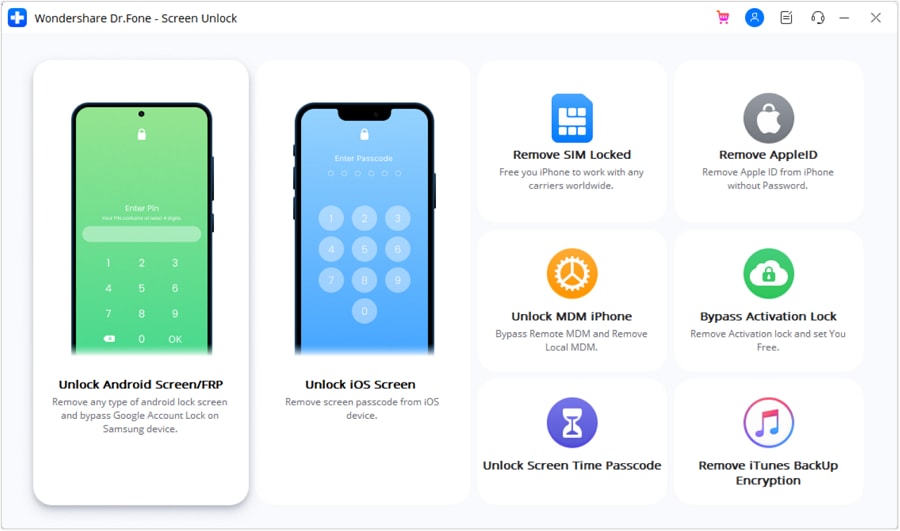
Step 3. Follow the on-screen instruction.
Boot your Apple iPhone 13 into DFU mode.
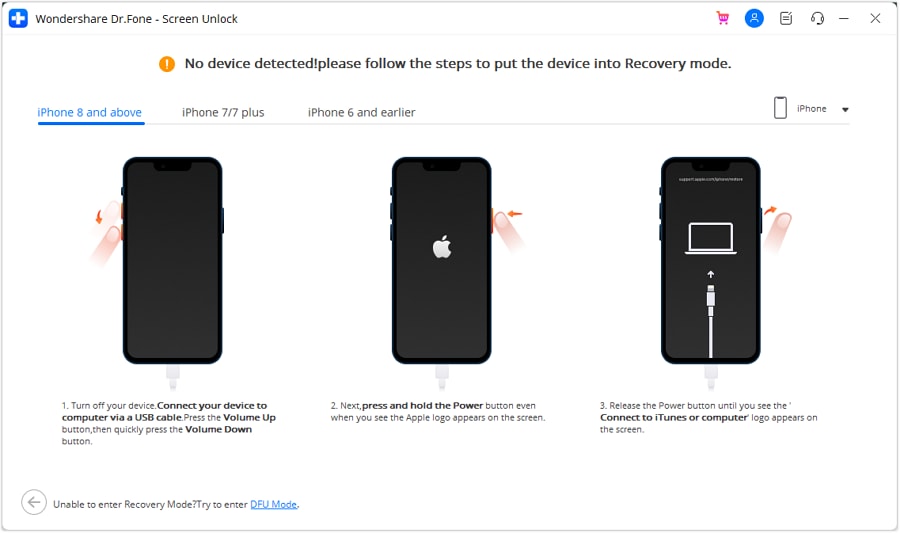
Select device information on Dr.Fone
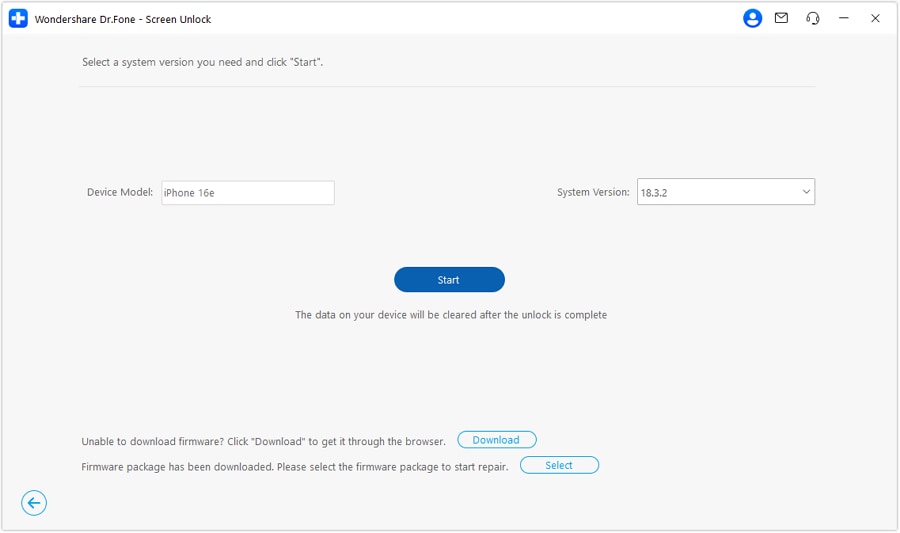
Step 4. Start to Unlock. The phone will be unlocked after that.
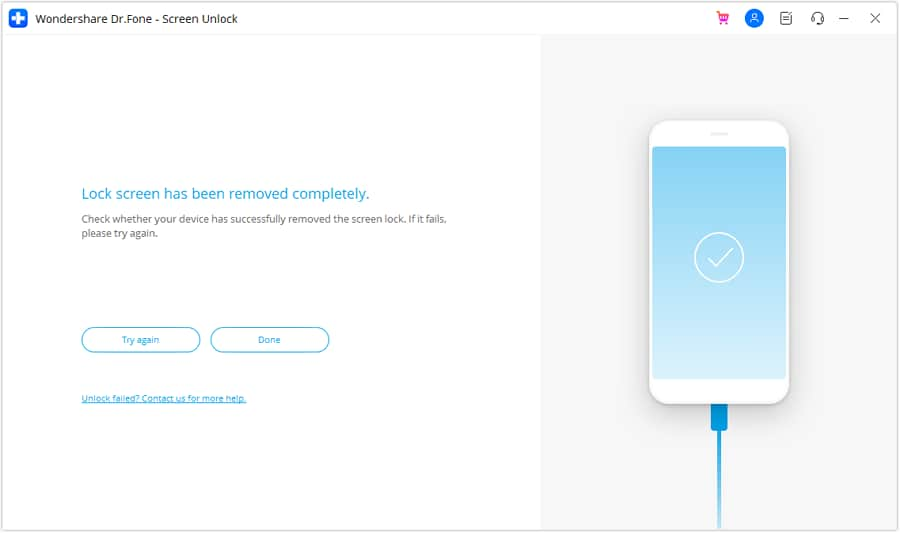
Part 4: Tips to protect your Apple iPhone 13 from being unlocked by thieves
As you can see, anyone can learn how to unlock the disabled Apple iPhone 13 4 without a computer and other iOS devices as well. Therefore, if you don’t want your Apple iPhone 13 and iPad to be misused by thieves, you should take some added measures. Follow these suggestions to increase security on your iOS device.
1. Disable Siri from the lock screen
If someone can’t access Siri from the lock screen, then they won’t be able to follow the above-mentioned process to unlock an iOS device. Therefore, it is highly recommended to disable Siri from the lock screen. To do this, visit your device’s Settings > Touch ID & Passcode, and under the “Allow access when locked” section, disable the option of “Siri.”

2. Enable Find My Apple iPhone 13 service
There are times when users forget to enable the Find My Apple iPhone 13 feature on their iOS device. To access this feature, make sure that it is turned on. To do this, go to your device’s Settings > iCloud > Find My Apple iPhone 13 and turn on the feature of “Find My Apple iPhone 13.” Additionally, you should turn on the “Send the last location” option as well.

3. Set a strong alphanumeric password
One of the best ways to secure your iOS device is by adding secure passwords. To do this, visit your device’s Settings > Touch ID & Passcode > Change Passcode and select the option of “Custom Alphanumeric Code.” Provide a strong alphanumeric passcode to boost the security of your device.

Conclusion
By implementing the above suggestions, you can easily make your iOS device more secure. Additionally, we have also listed two stepwise solutions that can unlock your iPad or Apple iPhone 13 without taking the assistance of a computer. Now when you know how to unlock a disabled Apple iPhone 13 without a computer, you can easily make the most out of your iOS device.
Learn How To Lock Stolen Your Apple iPhone 13 Properly
When it comes to security in smartphones, Apple stands at the forefront. The Activation Lock is a robust barrier to preventing unauthorized access and device theft. Losing your Apple iPhone 13 can be a disturbing event, as accidents are inevitable. Taking prompt action to stop unauthorized data access becomes important. This guide offers a step-by-step approach to how to lock a stolen iPhone.

Part 1. Major Threats To Consider When iPhone Is Stolen
A lost iPhone can become susceptible to a myriad of threats. It could compromise your privacy, security, and personal data. Here are the reasons why learning how to lock your Apple iPhone 13 when lost is essential:
- Unauthorized Access to Personal Data: Thieves can exploit an unsecured Apple iPhone 13 to gain unauthorized access to personal information. These include contacts, messages, emails, and photos.
- **Financial Exploitation:**With access to your Apple iPhone 13, thieves may attempt to get stored payment methods.
- Identity Theft: Stolen iPhones often contain a wealth of sensitive information. This makes them a prime target for identity theft.
- Compromised Social Media Accounts: Using social media applications on your smartphone carries potential risks in the event of device loss. Unauthorized access to your social media accounts can lead to many problems, including misinformation and compromised privacy.
Part 2. Use Find My To Locate Stolen iPhone
On learning about how do I lock my stolen iPhone, Apple’s robust Find My feature emerges as a beacon of hope. It uses a combination of GPS, Wi-Fi, and Bluetooth signals to locate your Apple iPhone 13 accurately.

Key Scenarios Where Find My Works
Find My can be a source to track stolen iPhones, but certain scenarios are associated with its operations. To know more about these scenarios, this section continues the discussion further below:
- iPhone Turned On:Find My can provide real-time location tracking when your stolen iPhone is still powered on and connected to the internet.
- **iPhone Turned Off or In Airplane Mode:**The last known location before the Apple iPhone 13 device was powered down or put in Airplane Mode is accessible, offering a starting point for recovery efforts.
- **Offline Finding with Bluetooth:**The Find My service leverages Bluetooth technology to create a vast network of Apple devices. With these, it can securely help locate your Apple iPhone 13, even offline.
- **Activation Lock Integration:**This service is also integrated with Activation Lock, adding an extra layer of security. The Activation Lock remains active if a thief attempts to erase your device.
How To Use Find My To Locate Your Stolen iPhone
- Step 1. Access the Find My app on a trusted device and open it. If you can’t access one, use the iCloud website to access Find My service.

- Step 2. After logging in, select the lost device, and you can see its last recorded location on the map.

Part 3. Using Lost Mode To Lock Stolen iPhone
Lost Mode locks the Apple iPhone 13 device and allows users to showcase a personalized message on the screen. This can help greatly in the safe return of the smartphone. The following are the simple steps you need to follow to learn how to block stolen iPhone with Lost Mode:
Activating Lost Mode Using Your Smartphone
- Step 1. Within the Find My app, tap “Devices” from the bottom toolbar and select your lost device. Now, scroll down to “Mark As Lost” and tap “Activate.”

- Step 2. You will now be given a summary of the Lost Mode; tap “Continue” to proceed. On the following screen, add a phone number, tap “Next,” and add a message that will be displayed on the lost device.

- Step 3. After adding a message, tap “Next” on the following screen and press “Activate” from the top right corner.

Activating Lost Mode Using iCloud Website
- Step 1. Access the iCloud website via your computer’s web browser. Sign in using your Apple ID, continue to click the “Grid” icon in the top right corner, and select “Find My.”

- Step 2. In Find My, add your Apple ID password again to access “All Devices.” Now, choose the lost device from the list of all devices in the top left corner. Then, click “Mark As Lost,” and the following pop-up Lost Mode prompt, tap “Next.”

- Step 3. Now go on to add your phone number and tap “Next.” Follow it by providing the message you want to display and click “Activate” to enable Lost Mode.

Part 4. Can’t Find Stolen Phone? Erase iPhone Completely
When efforts to locate a stolen iPhone fail, the need to protect sensitive data intensifies. As a result, the option to erase the Apple iPhone 13 device becomes a crucial step instead of how to lock the Apple iPhone 13 when lost. Here’s how to protect against the potential misuse of your information by erasing your device via Find My:
- Step 1. After accessing Find My service, choose the lost device from the list and click “Erase This Device.”

- Step 2. Select “Continue” on the erased iPhone screen for the Find My app. Once you’ve added the number, press “Erase” in the top right corner and follow the on-screen instructions to finish the procedure.

- Step 3. If using the iCloud website, tap “Erase This Device” and click “Next” on the upcoming prompt. You will be asked to enter the Apple ID password, after which you can use the on-screen guidelines to finish the process.

Part 5. Other Things To Do iPhone Is Stolen
There are additional measures you can take to enhance your overall security apart from understanding how do I lock my stolen iPhone. The following are some options you should utilize in case of device loss:
To Do List #1. Report to Police
If your Apple iPhone 13 is stolen, it is crucial to immediately inform your local law enforcement agency. It facilitates the recovery process and assists in combatting criminal activities. Provide essential details about your Apple iPhone 13, such as the Model, color, and IMEI number. Share information about your efforts to locate the stolen iPhone using Find My.

To Do List #2. Make an Insurance Claim With AppleCare
You can claim insurance if you have AppleCare+ coverage for your Apple iPhone 13. AppleCare+ with Theft and Loss for iPhone includes protection against theft and loss incidents. It offers up to two incidents of such coverage every 12 months.
To qualify for theft or loss coverage, it is necessary for Find My to be enabled on your device at the time it goes missing. Moreover, it should remain enabled alongside Lost Mode throughout the claims process.

To Do List #3. Remove iPhone From Trusted Devices (2FA)
After your Apple iPhone 13 is stolen, it becomes essential to bolster the security of your online accounts. It is particularly essential for those safeguarded by Two-Factor Authentication (2FA), which needs to be removed:
From iOS Device Settings
- Step 1. Access Settings on an iOS device logged in with the same Apple ID as the lost one. Here, tap on your name on the following screen and scroll down.

- Step 2. Simply select the misplaced device, and in the subsequent interface, press “Remove from Account” to eliminate it from the list of trusted devices.

From the Apple ID Website
- Step 1. If you cannot reach a secure device, visit the http://appleid.apple.com website and sign in with the identical Apple ID.

- Step 2. Once logged in, click “Devices” from the left side and select the lost device. To remove this device as a trusted device, click “Remove from Account.”

Part 6. Precautions To Take for Avoiding Losing iPhone
Users can proactively adopt specific measures to reduce the likelihood of such an occurrence. The following essential precautions are recommended while learning how to block your Apple iPhone 13 when stolen:
Precaution #1. Enable Find My on Device
Activating Find My increases the likelihood of recovering your device. Take the following steps to enable the Find My feature on your Apple iPhone 13:
- Step 1. On your iOS device, navigate to “Settings” and tap the Apple ID on the top. Now, scroll down and press “Find My” on the following screen.

- Step 2. Next, tap “Find My iPhone,” on the ensuing window, toggle “Find My iPhone.” This will enable the Find My service on your device.

Precaution #2. Enable Separation Alerts on iPhone
Enabling “Separation Alerts” assists in preventing the loss of your Apple iPhone 13 by alerting you when you distance yourself from it. Follow these steps to enable Separation Alerts on your Apple iPhone 13:
- Step 1. Navigate to and launch the Find My app on your Apple iPhone 13. Select the Apple iPhone 13 device from the “Devices” tab for which you want to enable separation alerts.

- Step 2. From the available options, tap “Notify When Left Behind,” and on the following screen, toggle “Notify When Left Behind.” You can also add locations on this screen by tapping “New Location,” for which you don’t want to receive a left-behind notice.

Precaution #3. Enable 2FA on iPhone
Activating Two-Factor Authentication (2FA) enhances the security of your Apple iPhone 13. The mandatory secondary verification step makes 2FA crucial in securing your accounts. Follow these steps to enable 2FA on your Apple iPhone 13:
- Step 1. Access the Settings app on your iOS device and tap your name/Apple ID. Find and tap “Sign-In & Security” to proceed further.

- Step 2. On the following screen, tap “Turn On Two-Factor Authentication.” Follow it by tapping “Continue” afterward, and use the on-screen instructions to complete the process.

Bonus Tip. Find Stolen iPhone Back but Locked? Unlock With Wondershare Dr.Fone
Recovering your stolen iPhone successfully can be a joyous event. Yet, the frustration of discovering your device locked due to a forgotten password can be disheartening. Wondershare Dr.Fone - Screen Unlock (iOS) offers a solution to regain access to your device. This robust tool is crafted to help users unlock various iOS screen lock scenarios.
It provides a hassle-free solution for those locked out of their devices. This powerful tool effortlessly removes various lock screens on iPhones and iPads. It can bypass the iCloud activation lock without the need for a password.
Key Features of Wondershare Dr.Fone
- If you are using iTunes for backup but have forgotten the iTunes backup encryption passcode, Dr.Fone can remove it without data loss.
- This tool can remove Apple ID from your Apple iPhone 13 or iPad if you have forgotten its password.
- You can free up your device by removing MDM and carrier locks using Dr.Fone.
Steps To Unlock Your Locked iOS Device Using Wondershare Dr.Fone
Wondershare Dr.Fone is a comprehensive toolkit that addresses many iOS-related issues. It offers a user-friendly solution to unlock your Apple iPhone 13 with the help of the following steps:
- Step 1. Launching Wondershare Dr.Fone and Accessing Toolbox
Once you have installed and launched Wondershare Dr.Fone, access the “Toolbox” tab. Click “Screen Unlock,” and on the following screen, choose “iOS.” Click “Unlock iOS Screen” on the following screen and link your iOS device to the computer.
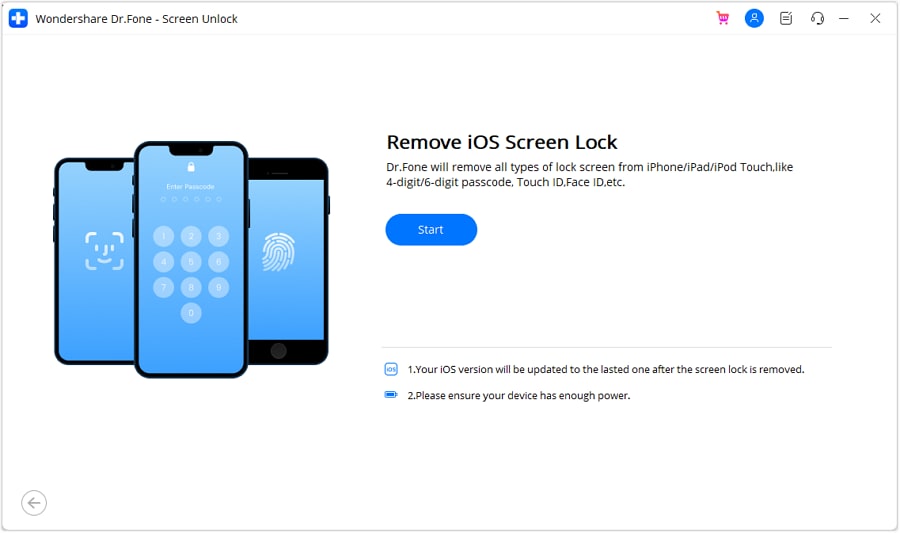
- Step 2. Entering Recovery Mode and Choosing System Version
The next step requires you to put your device in Recovery Mode, for which you can follow the instructions given on-screen. After your device is in Recovery Mode, Dr.Fone will display its “Model.” Now choose the appropriate “System Version” and click “Start.” Here, Dr.Fone will start downloading the required firmware. Once it is downloaded and verified, tap “Unlock Now.”
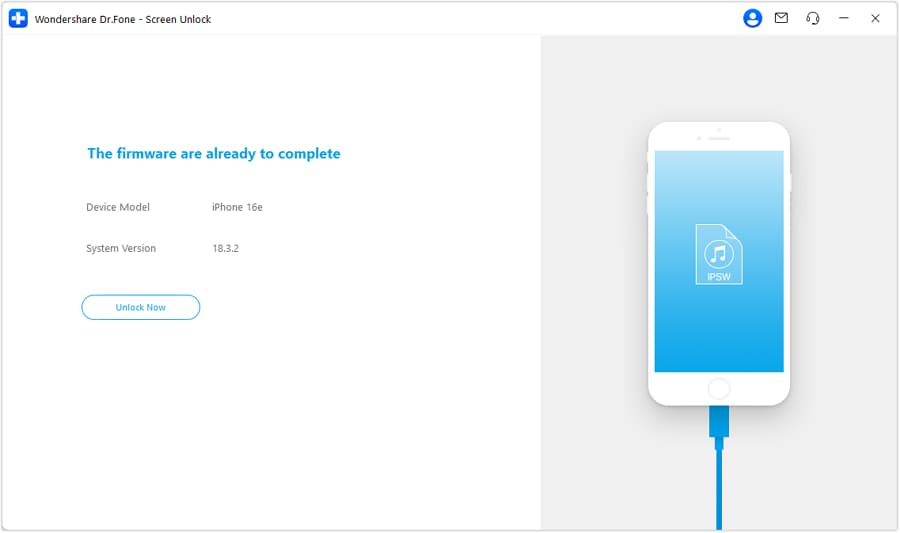
- Step 3. Acknowledging Data Loss Warning and Initiating Unlock Process
To show your acknowledgment of the warning, enter the asked code, which is “000000.” Afterward, click “Unlock” to initiate the screen unlocking process. Once the process is complete, tap “Done” to conclude the procedure.

Conclusion
Knowing how to lock stolen iPhones is essential for safeguarding personal and sensitive data. Apple’s Find My empowers users to remotely locate, lock, and erase their lost devices. If you have recovered your stolen device but it is locked, Wondershare Dr.Fone emerges as the top choice to unlock it within minutes.
Tips: Are you searching for a powerful Screen Unlock tool? No worries as Dr.Fone is here to help you. Download it and start a seamless unlock experience!
Resolve Your Apple iPhone 13 Keeps Asking for Outlook Password
Individuals and organizations use a diverse range of mail platforms to exchange information. Gmail, Outlook, or any alternative service is consistently utilized. While email platforms have revolutionized communication, they aren’t present without their challenges. Users often encounter issues that range from sync errors to authentication problems.
Among these challenges, iPhone users specifically grapple with a persistent issue. It often appears as “iPhone keeps asking for Outlook password.” This issue disrupts the user experience and raises security concerns. To address this problem, this guide presents a detailed guide featuring effective fixes.

Part 1. Why Does My iPhone Keep Asking for Outlook Password
The iPhone asking for Outlook password arises from a combination of factors. Understanding these reasons is crucial in diagnosing and resolving the problem effectively:
1. Incorrect Password Entry
Users might unknowingly enter the wrong password. They may have changed their Outlook password without updating it on their iPhones. This mismatch can trigger continuous password prompts.
2. Outdated Mail App
An outdated Outlook mail app on your Apple iPhone 13 may struggle to communicate with its latest security protocols. This can lead to performance issues like the Apple iPhone 13 keeps asking for passwords.
3. Network Connectivity Issues
Upholding a stable internet connection is necessary for effortless communication. An unreliable or unstable network can disrupt the synchronization process in Outlook.
4. Corrupted Email Account Profile
A corrupted email account profile on the Apple iPhone 13 can cause disruptions during the authentication process. Resetting the email account on the Apple iPhone 13 device might be necessary to resolve the issue.
5. Third-Party App Interference
Other mail applications installed on the Apple iPhone 13 can also cause an issue. They might interfere with the Outlook app’s proper functioning. Identifying and temporarily disabling such apps can help diagnose and resolve the issue.
6. Excessive Email Fetching
Configuring the Outlook mail app to fetch emails too frequently causes the issue. It can strain the connection with Outlook servers, leading to authentication challenges. That causes issues like the Apple iPhone 13 asking for a password.
7. iOS Software Glitches
The smooth functioning of the Mail app may be disrupted by problems and malfunctions present in the iOS software. Compatibility issues could emerge if your device is not operating on the latest iOS version.
Part 2. [Fixes] Solve iPhone/iPad Keeps Asking for Outlook Password
Now that we have explored why the iPad keeps asking for an Outlook password, it is time for practical solutions. These 13 fixes discussed below are designed to address the root causes comprehensively:
Fix 1. Add Password Once and Let the Prompt Disappear
If your Apple iPhone 13 continuously prompts you for the Outlook password, a simple solution is to re-enter the password. Follow these steps to potentially resolve the issue once and for all by accessing the respective settings:
- Step 1. You begin by accessing your iDevice’s “Settings” app and scrolling down to tap the “Mail” option. Next, press “Accounts,” and on the following screen, select the Outlook account.

- Step 2. Encountering the error message “Account not authenticated” is what you will come across. Now, tap the “Re-enter Password” option to enter your correct Outlook password.

Fix 2. Change the Password to Your Outlook Mail
Sometimes, the email service provider may force users to change their passwords for security reasons. There is a chance that it is why your iPhone asks for an Outlook password. To modify your Outlook password from the desktop platform, adhere to the following steps:
- Step 1. Open your preferred web browser and go to the Outlook login page. Sign in to your Outlook account, locate, and click on your profile picture in the upper-right corner. There, click “My Profile,” and on the next screen, tap “Change Password” near the upper right corner.

- Step 2. Upon reaching the verification page, provide your password and tap the “Sign In” button. Afterward, you will be asked for other verification methods. Upon verifying, the “Change your password” window will appear. Here, you will need to enter your “Current password,” “New password,” and re-enter it to proceed. Then, hit the “Save” button, and your password will be changed.

Fix 3. Checking the Network Connection
Network inconsistencies can often disrupt the authentication process. This can be the leading cause behind persistent password prompts. To ensure a stable connection, ensure that you are connected to a reliable and stable Wi-Fi network. You can also try toggling the Wi-Fi and mobile data switches on and off.
Another way to confirm if network errors are the problem is to try enabling Airplane Mode. After a while, disable the Airplane Mode and check if the issue is resolved.

Fix 4. Using the Mail Toggle as a Remedy
A strategic approach to resolving authentication issues involves using the Mail toggle. You can use it to disable and re-enable the email services. This action essentially resets the Outlook app’s connection and can be performed as follows:
- Step 1. Within your Apple iPhone 13’s “Settings” app, scroll down and tap “Mail.” On the following screen, press “Accounts” and choose the “Outlook” account.

- Step 2. Here, you will find the toggle switch for “Mail.” Now, turn off the email service and wait for a few moments. Toggle the switch back on to re-enable the email service.

Fix 5. Delete and Re-Insert Outlook Account
Deleting and re-inserting your Outlook account on your Apple iPhone 13 can provide a fresh start to the email integration. Follow these steps if the persistent iPhone keeps asking for an Outlook password:
- Step 1. Navigate to the “Mail” tab within the “Settings” app on your Apple iPhone 13, and choose “Accounts” to observe the roster of email accounts. Here, tap on your Outlook account, and the following screen, press “Delete Account.”

- Step 2. Once you have deleted the account, return to the “Accounts” tab. Select “Outlook.com” after tapping on “Add Account.” Now, follow the on-screen instructions to re-enter your account details.

Fix 6. Re-Check Sync Settings
Ensuring that your sync settings align with Outlook’s recommended configurations is crucial. Follow these steps to re-check and adjust your sync settings on your Apple iPhone 13:
- Step 1. After accessing the “Mail” tab within the Settings app, tap “Accounts.” Here, find and choose the “Fetch New Data” option, followed by selecting the “Outlook” account.

- Step 2. Confirm that the “Push” or “Fetch” settings are configured to your preference. “Push” enables real-time updates, while “Fetch” allows you to set specific intervals for email updates.

Fix 7. Uninstall and Re-Install Outlook App
Is the Outlook app generally showing a lot of glitches on your Apple iPhone 13? If yes, uninstalling and then re-installing it can address potential “iPhone**/iPad keeps asking for Outlook password”** issues:
Instructions: On your Apple iPhone 13’s home screen, navigate to the Outlook mail app. Long-press the Outlook app icon and choose “Remove App” from the pop-up menu. Then, tap “Delete App” and follow it by pressing “Delete” to uninstall the app. Afterward, access the App Store and download the Microsoft Outlook app again.

Fix 8. Update iOS From Settings
Outdated iOS versions can contribute to compatibility issues and glitches. This can affect the proper functioning of the Mail app and its integration with Outlook. Follow these steps to ensure your iOS is up to date:
Instructions. Access your device’s “General” settings from the Settings app. Tap “Software Update” on the next screen and check if an update is available. Tap “Install Now” to kick-start the iOS updating process if an update is available. Make sure your device is adequately charged and maintains a stable internet connection.
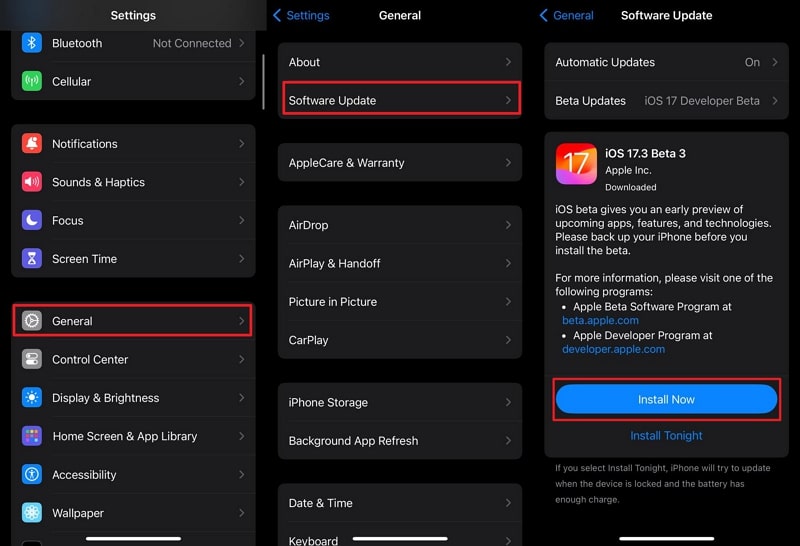
Fix 9. Try Other Alternatives to Outlook
Exploring alternative mail applications may offer a viable workaround. This is especially true if the iPhone asking for the Outlook password proves resistant to previous solutions. Consider using other email platforms such as Apple Mail, Gmail, and Yahoo Mail. This solution might not directly resolve the issue with Outlook. Yet, an alternative can provide a temporary workaround until a solution is found.
=

Fix 10. Try Disabling Privacy Protection
Certain privacy protection features on your Apple iPhone 13 may interfere with the integration of Outlook. To troubleshoot this, consider temporarily disabling privacy protection settings:
Instructions. On your Apple iPhone 13, access “Mail” settings through the Settings application. Now, scroll down to find and tap the “Privacy Protection” option in the “Messages” section. Next, you will come across the “Protect Mail Activity” switch. Here, toggle off the switch to check if it is resolved.

Fix 11. Reset All Settings of the iPhone
If the persistent password prompts remain unresolved, resetting all settings on your Apple iPhone 13 can be the solution. It acts as a comprehensive solution to potential configuration issues. This action does not erase your data but resets system settings to default. To reset all settings on your Apple iPhone 13, you can follow these steps:
- Step 1. Navigate to the “General” tab in the “Settings” app on your Apple iPhone 13 after you open it. Move down the screen, and at the bottom, choose “Transfer or Reset iPhone.”

- Step 2. On the following screen, tap “Reset” and select “Reset All Settings” from the available options. Enter your device passcode if prompted and confirm the action by selecting “Reset All Settings” again.

Fix 12. Add an Account by Switching to IMAP
In some cases, switching the account type to IMAP during the setup process can help resolve issues. For many users, it has worked to resolve issues related to Outlook password prompts. Follow these steps to add your Outlook account using the IMAP protocol:
- Step 1. Begin by accessing the “Settings” app on your Apple iPhone 13, then scroll down to locate and tap on “Mail.” Within this section, choose “Accounts” to display the roster of email accounts, and proceed to tap on “Add Account.”

- Step 2. Choose “Other” as the account type and select “Add Mail Account.” Enter your Name, full Outlook email address, descriptive description, and unique password, and hit “Next.”

- Step 3. Utilize the specified settings for the “Incoming Mail Server” and “Outgoing Mail Server” sections under the “IMAP” tab:
Incoming Mail Server
Hostname: imap-mail.outlook.com
Username: Your full Outlook email address
Password: Your Outlook password
Outgoing Mail Server
Hostname: smtp-mail.outlook.com
Username: Your full Outlook email address
Password: Your Outlook password
At last, hit the “Next” button at the top-right side of the screen.

Fix 13. Contact Support of Outlook To Resolve
If none of the previous fixes resolve the issue, seek help directly from Outlook Support. Outlook’s support is capable of addressing a broad spectrum of issues. It is adept at delivering personalized assistance tailored to your circumstances.
Bonus Part. Can’t Access Outlook Because iPhone Is Locked? A Quick Solution
The iPhone keeps asking for an Outlook password, which isn’t the only password-related problem. Forgetting the screen locks of their iPhones is a common phenomenon. It is especially prevalent among iPhone users. You can no longer access important Outlook emails when your Apple iPhone 13 is locked. That is where Wondershare Dr.Fone emerges as your savior. This powerful tool can bypass all types of iOS screen locks within minutes.
It can remove lock screens on your Apple iPhone 13, iPad, and iPod. You can say goodbye to the hassle of dealing with iCloud activation locks. Moreover, it helps remove your Apple ID if you have forgotten your Apple ID password. Dr.Fone allows you to bypass them effortlessly without requiring a password.
Prime Features of Wondershare Dr.Fone
- It can circumvent Mobile Device Management and screen time restrictions without data loss.
- This tool completely supports the most recent iOS 17, iPadOS 17, and iPhone 15.
- Additionally, this software effortlessly bypasses carrier locks on your Apple iPhone 13.
Steps To Unlock Your Apple iPhone 13 via Wondershare Dr.Fone
Unlocking your Apple iPhone 13 using Wondershare Dr.Fone is a straightforward process. That is made possible with its intuitive interface and a simple 3-step procedure. You can use the following steps to bypass your Apple iPhone 13’s screen lock within minutes:
- Step 1: Access Screen Unlock by Launching Dr.Fone
Once you’ve launched Dr.Fone on your computer, go to Toolbox. Here, tap “Screen Unlock” and choose “iOS.” In the opened window, choose the “Unlock iOS Screen” option to unlock your iOS device’s screen. On the subsequent screen, click “Start” to commence the iOS device unlocking process.

- Step 2: Initiating iPhone Recovery Mode and Device Identification
Subsequently, you need to place your Apple iPhone 13 into Recovery Mode. Adhere to the on-screen instructions corresponding to the model of your iDevice. Afterward, the tool will automatically detect the “Device Model.” If necessary, adjust the model and choose the “System Version.” Once these steps are completed, click “Start” to initiate the unlocking process.

- Step 3: Finalizing iOS Device Unlock
Monitor the iOS firmware download progress on the screen. After successful download and verification, proceed by selecting “Unlock Now.” A confirmation window will appear, prompting you to input the necessary code. Enter the code and tap Unlock to proceed to the outcome. Upon unlocking the iDevice, click the “Done” button to finalize the process.
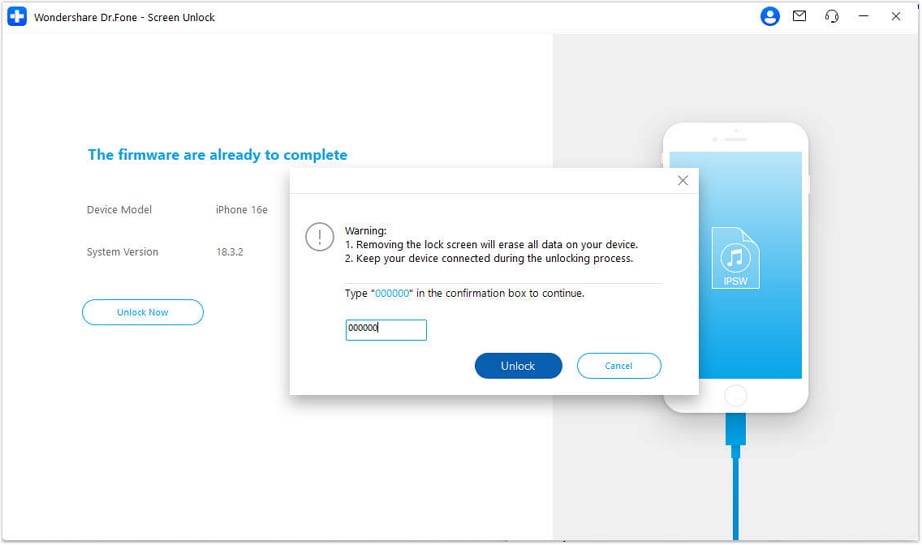
Conclusion
To summarize, resolving an iPhone asking for an Outlook password requires a systematic approach. From re-entering passwords to adjusting settings, this guide has covered 13 comprehensive fixes. For those facing the challenge of a locked iPhone, Dr.Fone offers a reliable solution. Users can ensure integration between their iPhones and Outlook by addressing these issues. This will enhance their overall email experience.
Tips: Are you searching for a powerful Screen Unlock tool? No worries as Dr.Fone is here to help you. Download it and start a seamless unlock experience!
Also read:
- [Updated] 2024 Approved Top 10 Social Media Tag Analyzers FB, Twt & Insta
- [Updated] Premium Drones, Best Deals Today
- [Updated] The Art of Influential Facebook Video Marketing for 2024
- Comment Supprimer Avec Efficacité Les Données Du Disque Dur Sur Windows Server?
- Full Guide to Unlock Apple iPhone SE (2020) with iTunes | Dr.fone
- How to Unlock Apple iPhone 6 Plus Passcode without Computer? | Dr.fone
- In 2024, Detailed Review of doctorSIM Unlock Service For iPhone 8 Plus | Dr.fone
- In 2024, Forgot Locked iPhone 12 mini Password? Learn the Best Methods To Unlock | Dr.fone
- In 2024, How Do You Unlock your iPhone 7? Learn All 4 Methods | Dr.fone
- New In 2024, FCPX Freezing or Crashing? Try These Quick Fixes
- Talk Translator Essential Offline Text Recognition Software for 2024
- The Ultimate Guide to Getting FIFA 21 Up and Running Successfully
- Title: In 2024, How to Unlock Disabled Apple iPhone 13/iPad Without Computer | Dr.fone
- Author: Amelia
- Created at : 2025-02-26 00:50:32
- Updated at : 2025-03-04 02:14:05
- Link: https://iphone-unlock.techidaily.com/in-2024-how-to-unlock-disabled-apple-iphone-13ipad-without-computer-drfone-by-drfone-ios/
- License: This work is licensed under CC BY-NC-SA 4.0.
